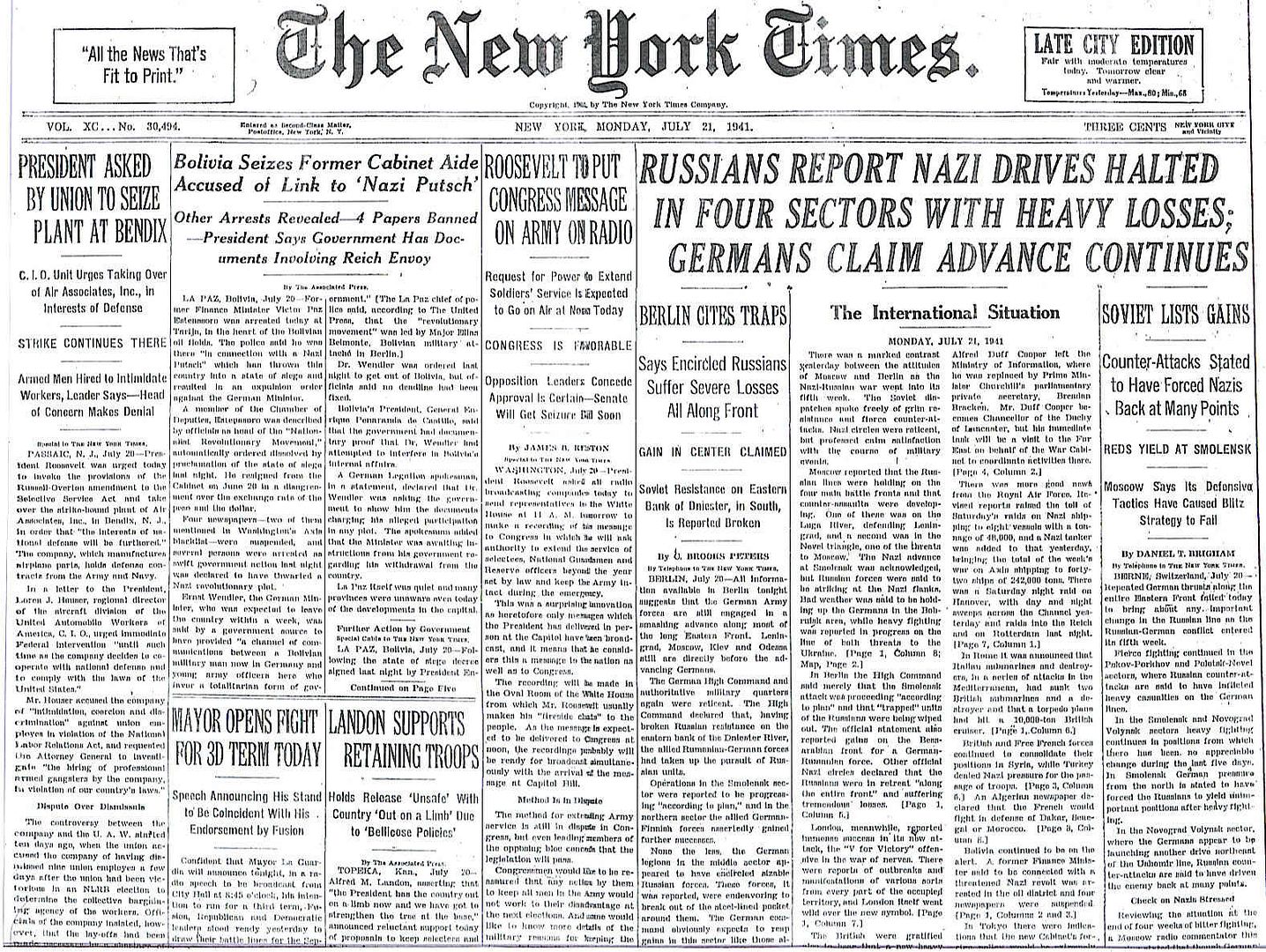
Posted on 07/21/2011 5:26:05 AM PDT by Homer_J_Simpson

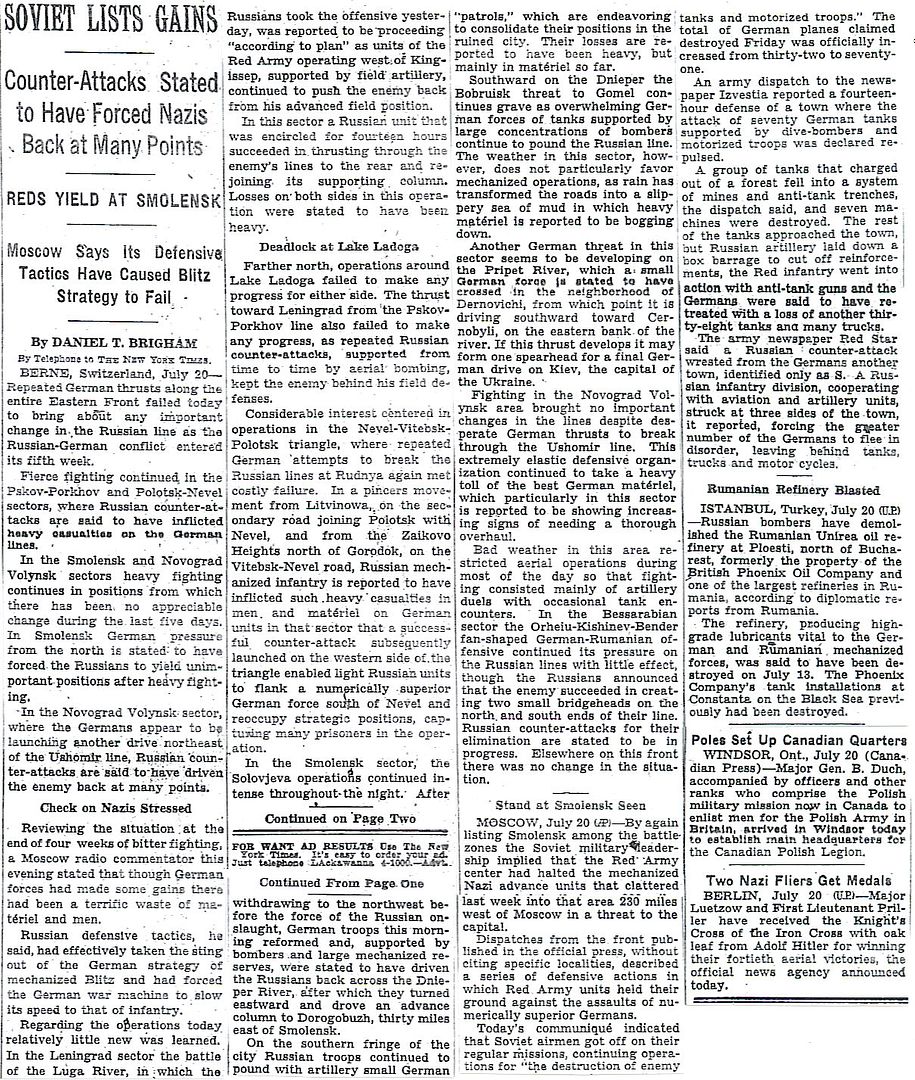
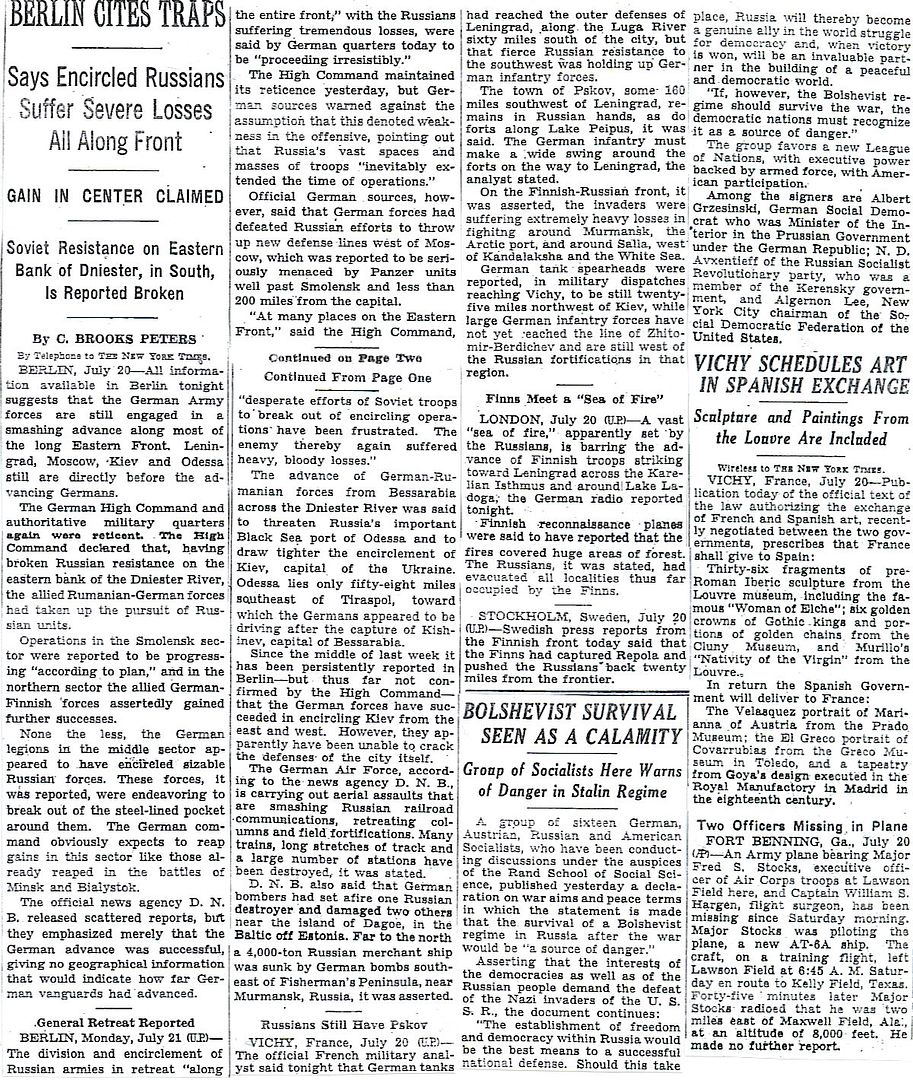
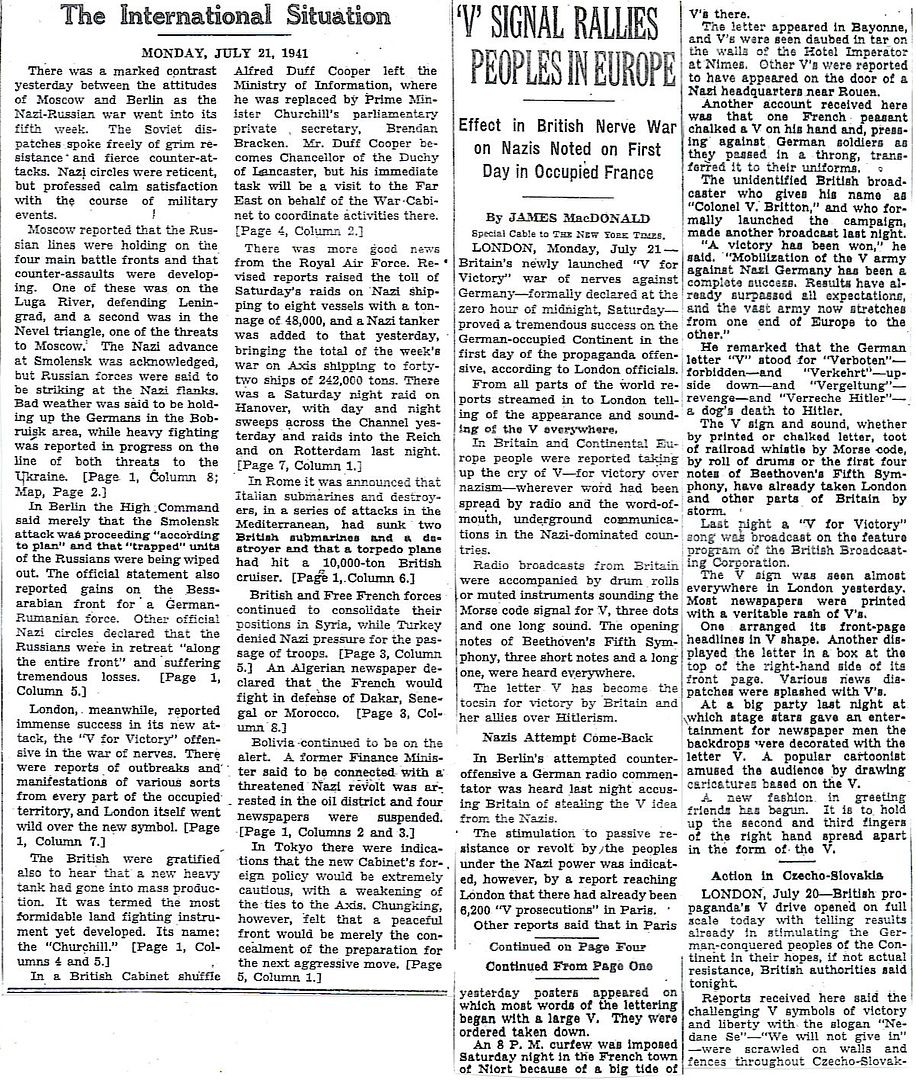
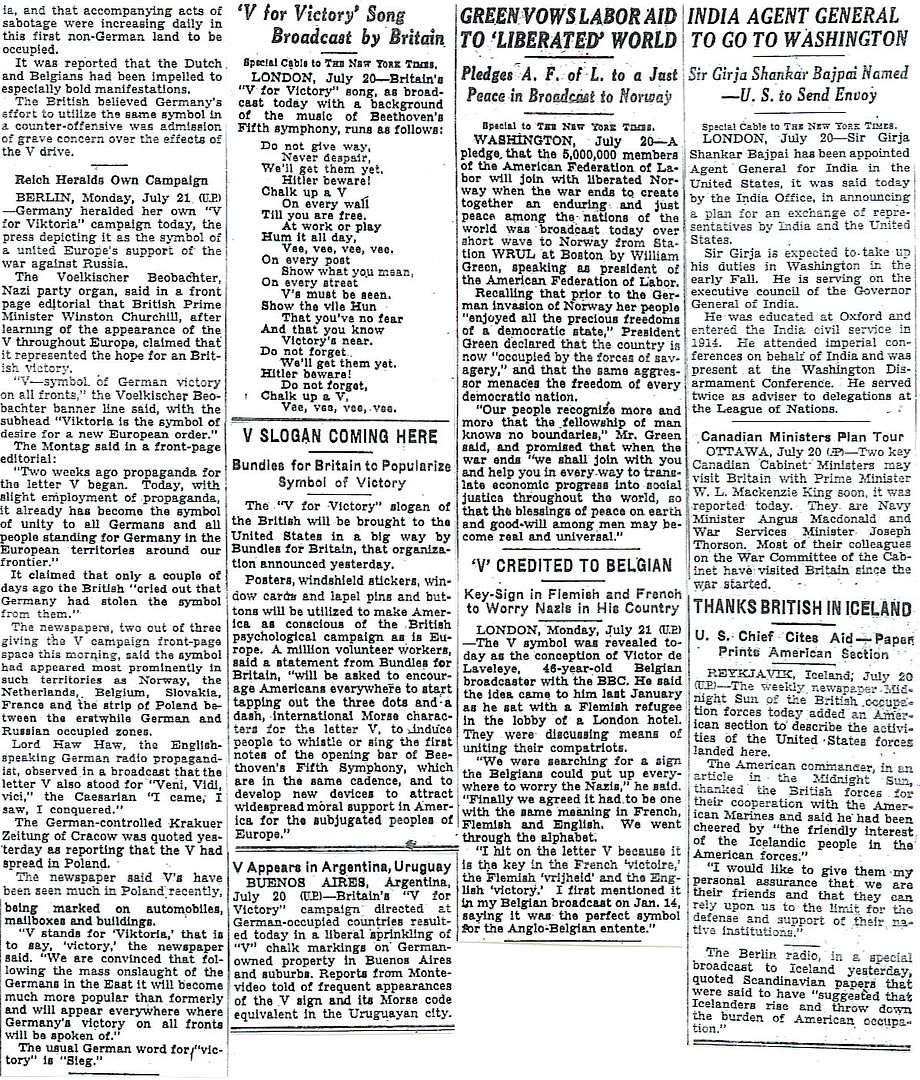
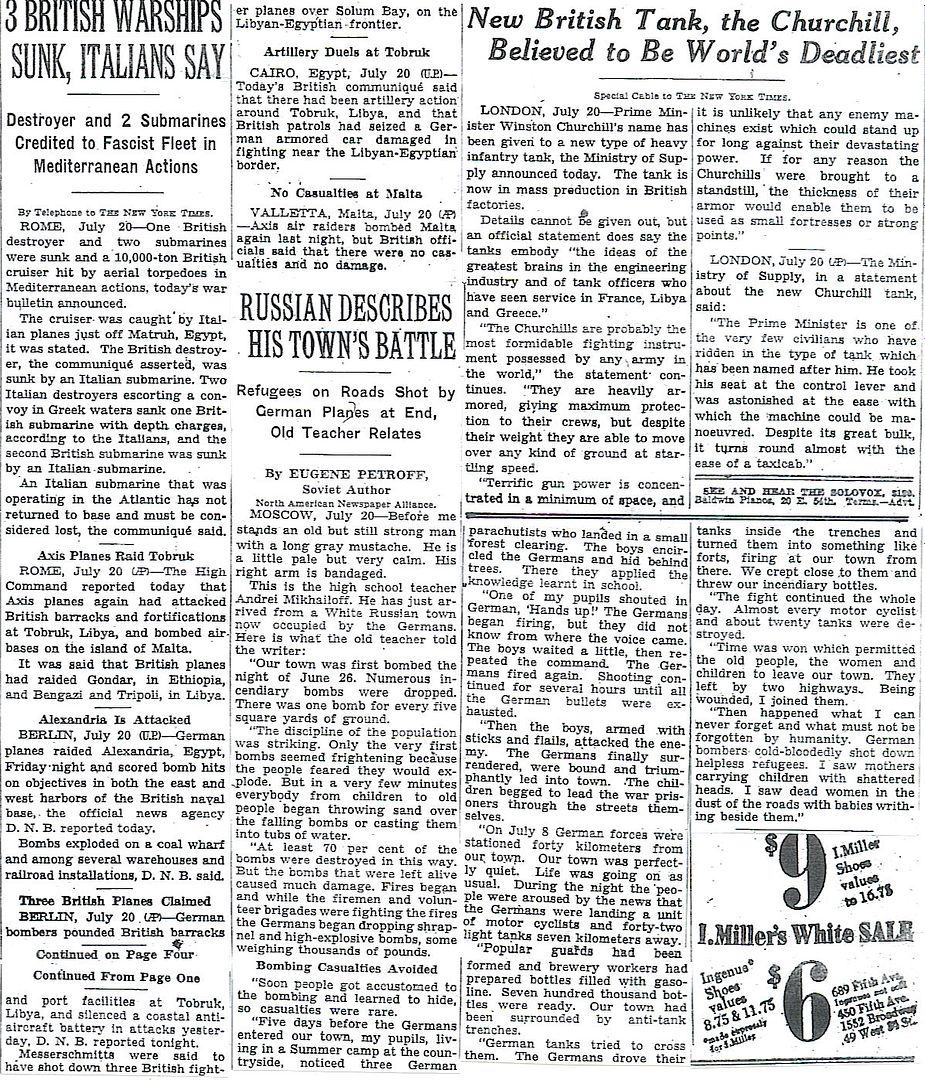
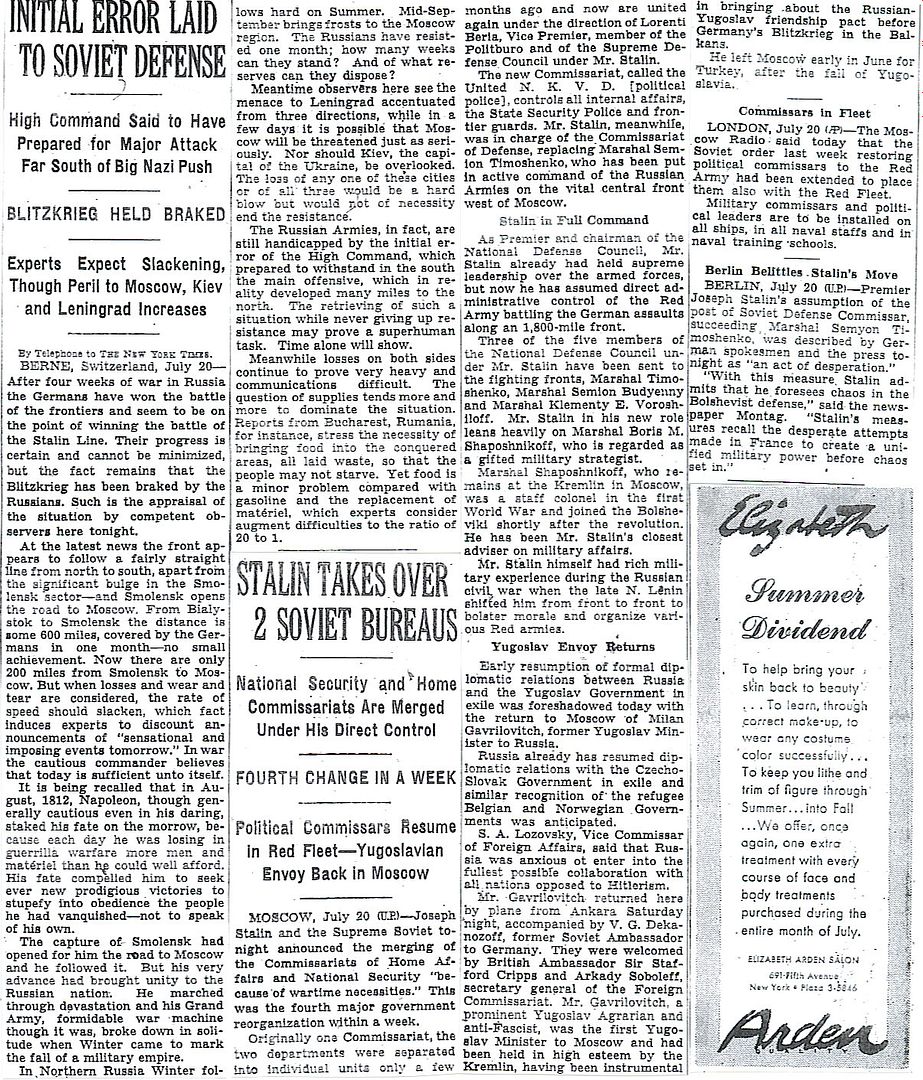
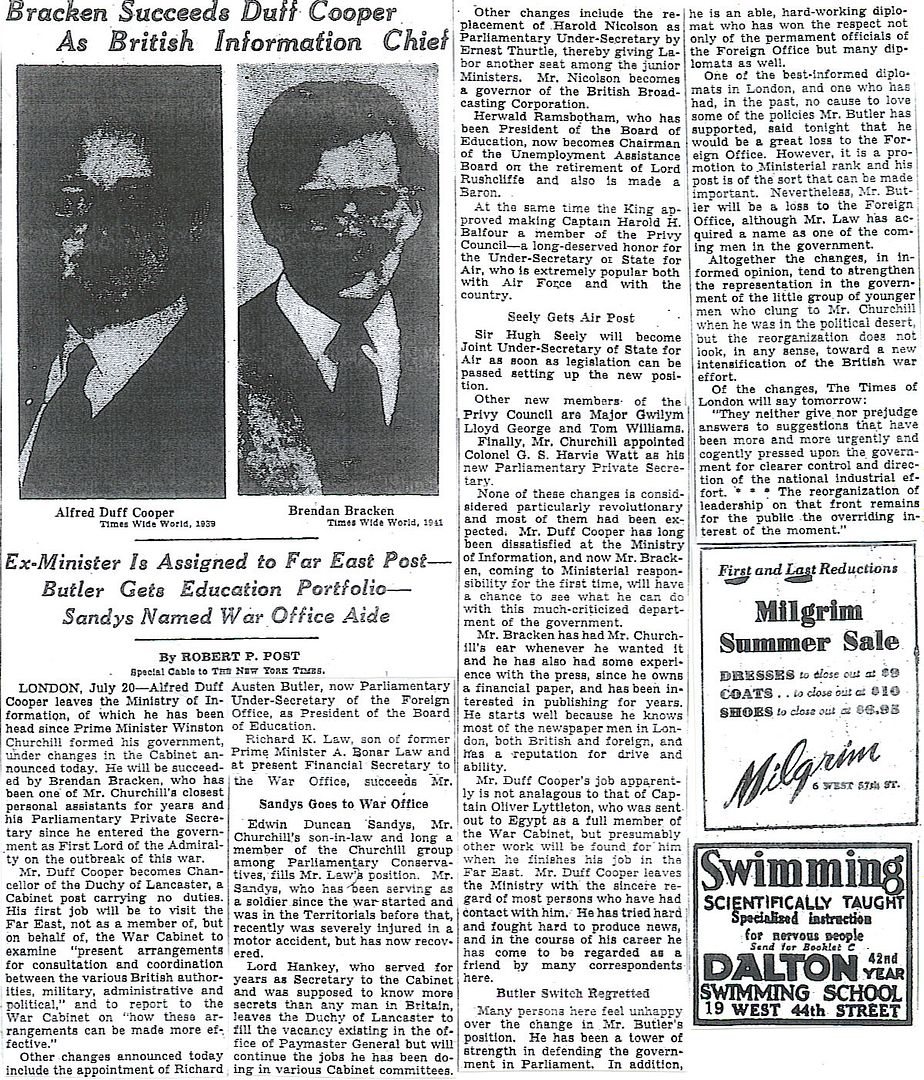
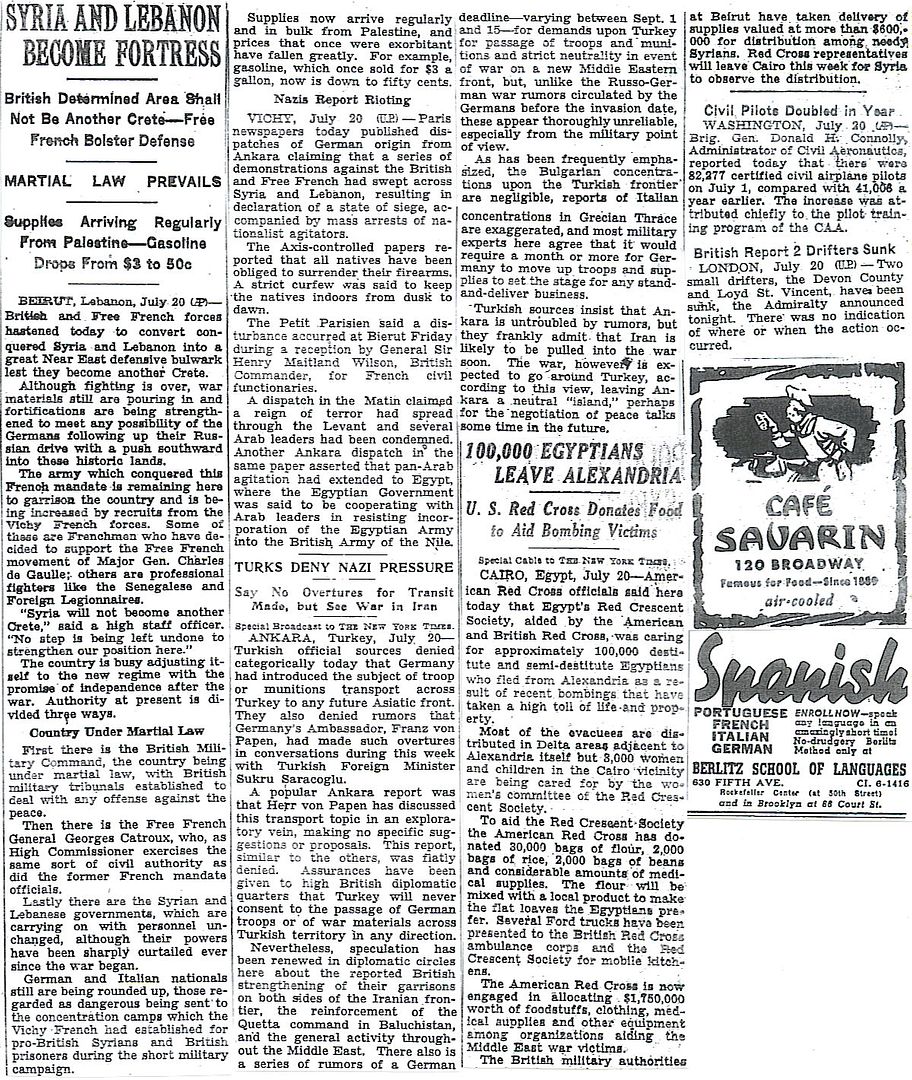
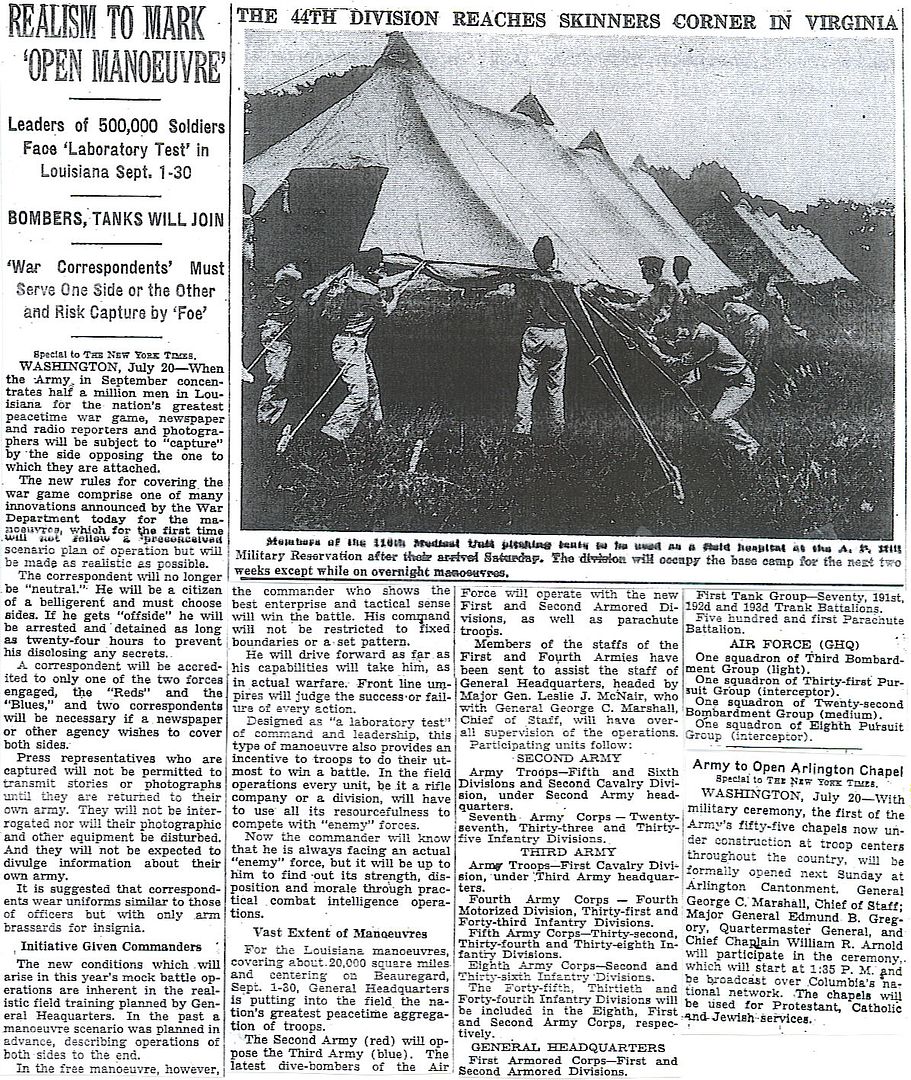
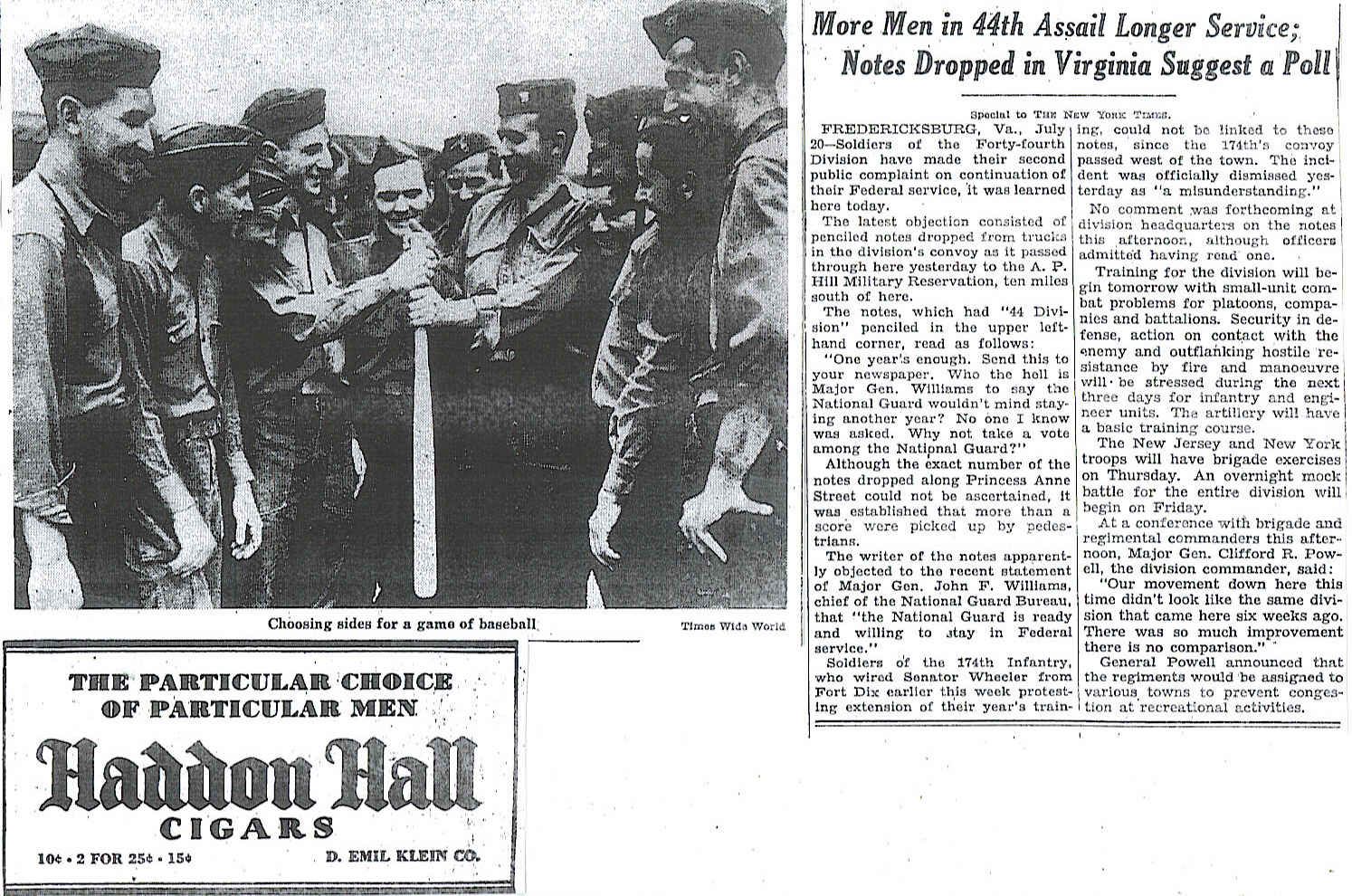
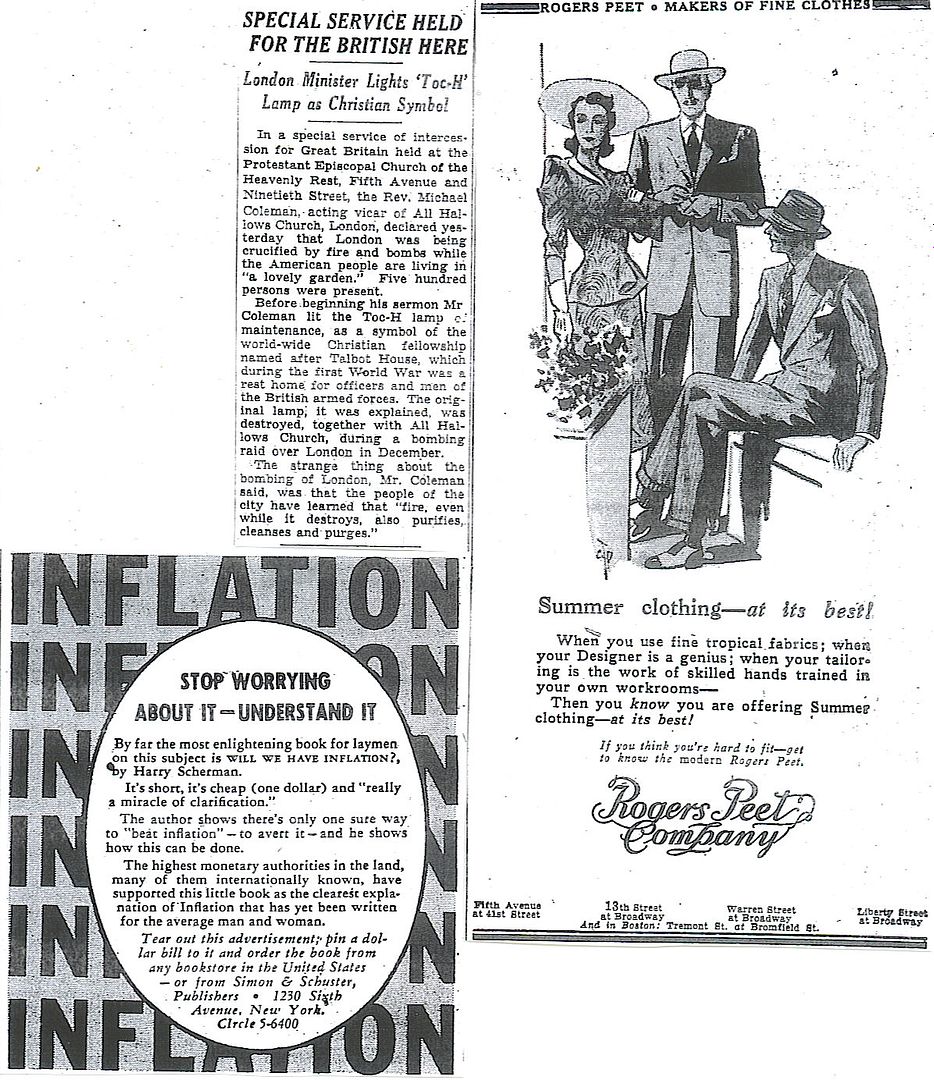
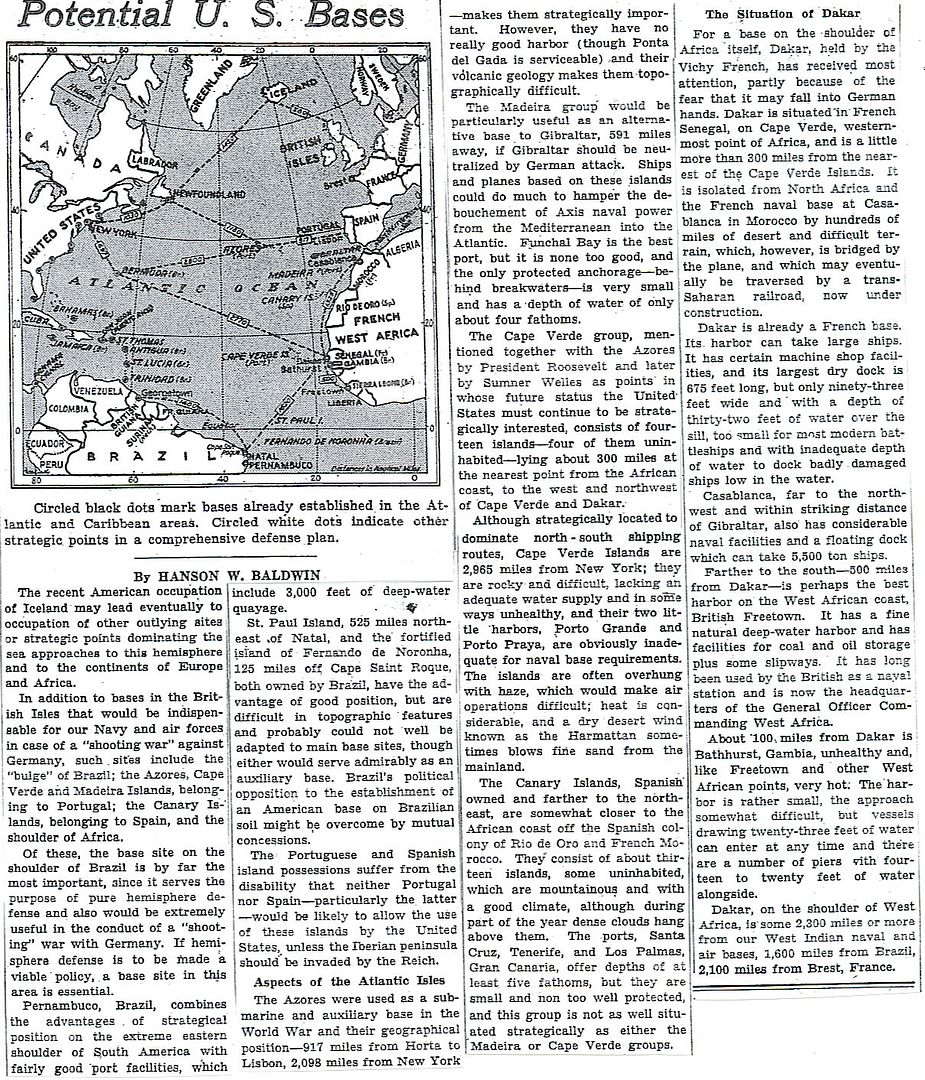
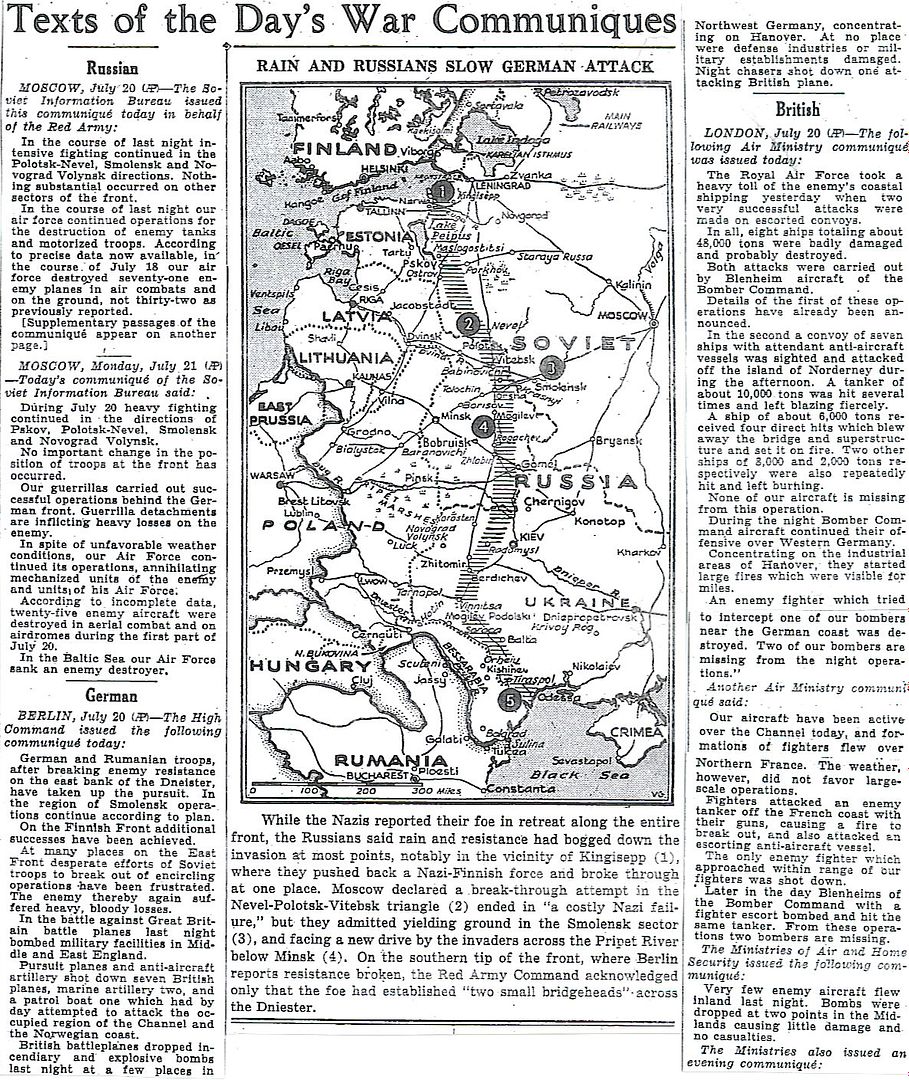
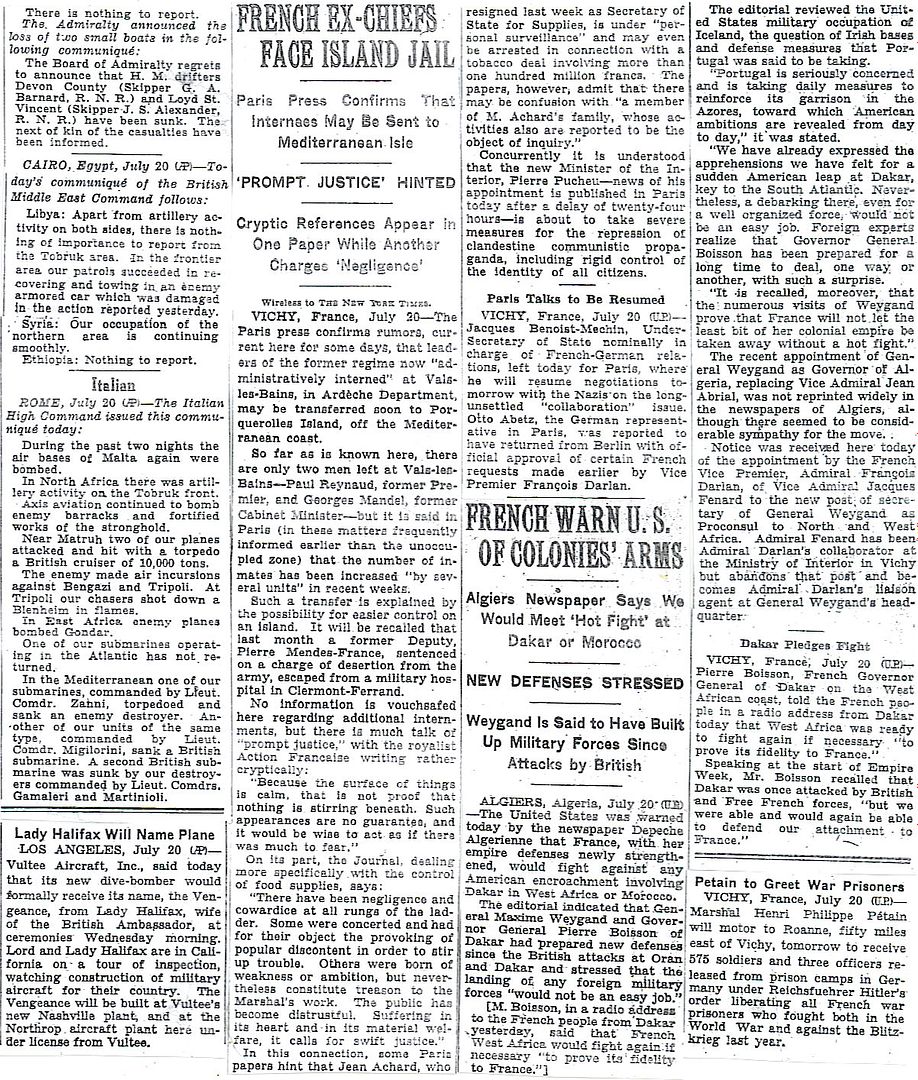
http://www.onwar.com/chrono/1941/jul41/f21jul41.htm
Germans bombing Moscow
Monday, July 21, 1941 www.onwar.com
On the Eastern Front... There are more German air attacks on Moscow. The Soviet authorities announce that they have withdrawn their forces from the line of the Dniestr River.
In Washington... Roosevelt asks Congress to extend the draft period from one year to 30 months and to make similar increases in the terms of service for the National Guard. There is considerable debate on the proposal.
In the Mediterranean... A major operation, code named Substance, is launched by the British Gibraltar forces to bring supplies to Malta. There are seven transports in the convoy and they are covered by Force H which has been reinforced for the operation. In addition to Renown, Ark Royal, a cruiser and eight destroyers, the Home Fleet has sent Nelson, three cruisers and nine destroyers.
http://homepage.ntlworld.com/andrew.etherington/month/thismonth/21.htm
July 21st, 1941
UNITED KINGDOM: Hugh Dalton, the Minister for Economic Warfare and head of the Special Operations Executive, tells Churchill that he can now “set in motion ... schemes for full-scale revolution in Europe.”
Minesweepers HMS Cadmus and Circe laid down. (Dave Shirlaw)
VICHY FRANCE: The government accepts Japans’ demand for military control of French Indochina.
U.S.S.R.: Minsk: SS troops rope together 45 Jews and order 30 White Russians to bury them alive in a pit; when the White Russians refuse, all 75 victims are machine-gunned to death.
During the night German bombers took off from airfields near Smolensk on a heading for Moscow, and the commander of the Moscow air defence, Maj. Gen. M.S. Gromadin, set off the first grand alert in the Soviet capital. The raid was carried out by 127 bombers flying in several waves, which dropped 104 metric tons of bombs. The Soviet high command, STAVKA, allegedly knew about the German preparations for the assault 2 days before it took place, and this explains why German air crews reported that defensive fire over Moscow was even more powerful than over London. But despite the heavy flak fire, only a few Soviet night fighters appeared to fight off the attackers.
Soviets withdraw their forces from the Dniestr.
Soviet submarine M-94 of the Baltic Fleet is sunk by U-140 near Ristna Lighthouse off Dago Island. (Mike Yared)(146 and 147)
SPAIN: U-109 refueled from the German supply ship Thalia at Cadiz. (Dave Shirlaw)
GIBRALTAR: Convoy “Substance” leaves for Malta.
EGYPT: Cairo: de Gaulle meets with the Minister of State in Cairo, Oliver Lyttleton. Angry over the treatment of the Free French by the Syrian armistice he hands Lyttleton a memorandum:
“Free France, that is to say France, is no longer willing to entrust to the British military command the duty of exercising command over the French troops in the Middle East. General de Gaulle and the French Empire Defence Council are resuming full and entire disposal of all the French forces of the Levant as from 24 July 1941, at midday.”
CANADA: Minesweeper HMCS Guysborough launched North Vancouver, British Columbia. (Dave Shirlaw)
U.S.A.: Washington: Roosevelt asks Congress for permission to extend the Selective Service Act so that troops are retained for 30 months in the armed forces after completing one year in service.
Minesweepers USS Velocity, Tumult, Token laid down.
Destroyers USS Evans and John D Henley laid down.
Submarine USS Gunnel laid down. (Dave Shirlaw)
The Churchill is “the world’s deadliest tank”? Don’t the Brits talk to the Russians? Don’t they talk to their troops fighting in Africa? Do they send what they’re smoking to front line units?
So IYO the Pz Mk III/IV were better than the British MBT of the era?
Seesh. Even the socialists get one right occasionally.
Pg. 3 “..survival of a Bolshevist regime in Russia after the war would be a ‘source of danger’”.
Ya think?
Mighty handsome man that Percival.
And, would have been held in higher regard if Churchill had given him those Matilda tanks he requested.
Page 6, article: Russian describes his town’s battle.
Citizens fight off small scale German infiltrations with bluffs and Molotov cocktails.
It has been fashionable to describe Hitler's turning away from Moscow as the key error of the summer campaign.
This view cannot be proved wrong, but the author does not believe that Hitler's decision to turn towards Kiev, with the time lost in consequence, was the sole cause of the subsequent disaster before Moscow.
Upon objective consideration Hitler's decision seems, in many respects, justified and reasonable.
The battles of the summer had shown one thing clearly: the different rate of advance of armor and infantry had inevitably divided the army into two successive parts which not only moved separately but also fought their engagements separately. This represented a serious weakness which the enemy might well exploit as soon as he had realized the German mode of operation. Various attested remarks of Stalin show that he had understood the German method by the end of July 1941.
Moreover, the debilitating effect of the geographically vast area and the heavy wastage which resulted mean that no further justification is required. It is also true that owing to the much slower advance of Army Groups North and South the flanks of Army Group Centre remained exposed. The Soviet Fifth Army was a real threat to Bock's extended flank. Something had to be done to protect the flanks. The experience gained in battles of encirclement, moreover, suggested that in future the Russian forces ought not to be crushed in operations involving such great distances, but in closer cooperation between Panzer Groups and infantry. In the light of what has since become known about the strength of Soviet armor and their inexhaustible reserves of manpower, Hitler's caution does not appear unreasonable.
But—and this is an important but—for a strategy of caution it was then too late.
On the Central Front Germany was already involved far too deeply in Russian territory. If the idea of a Blitzkrieg against the heart of the Soviet Union was dropped altogether and the enemy given time to recover, then surely the campaign and probably the whole war was lost.
Seen in this light, Hitler's decision represented an admission that Yelnya-Smolensk had broken the impetus of the German Blitzkrieg. If the generals accepted that view it meant the basis of Operation Barbarossa had become invalid. It was this view that Halder, the Chief of the General Staff, and the commanders in the field, especially Guderian, were trying to oppose. "What can we do against this decision?" asked Bock.
Halder shook his head. "It is immutable."
"We've got to upset it," Guderian persisted. "If we head for Kiev first we shall inevitably get involved in a winter campaign before we can reach Moscow. What the roads and our supply difficulties will be like then I shudder to think. I doubt that our tanks are up to the strain. My Panzer corps, especially XXIV Corps, have not had a single day's rest since the beginning of the campaign."
Field-Marshal von Bock agreed. There was a heated discussion. Eventually it was decided that Guderian should accompany Halder to the Fuehrer's headquarters, request an interview, and try to change Hitler's mind.
Late in the afternoon the aircraft started for Rastenburg, in East Prussia. As Guderian said good-bye to von Bock, the Field-Marshal quoted the words attributed to the officer of the guard at the bishop's palace in Worms on 17th April 1521, to Martin Luther, as he set forth to justify his teaching to the Emperor: "Little monk, little monk, yours is a difficult road."
Within two hours of his arrival Guderian stood in the map-room of the Fuehrer's hut, making his report on the state of his Panzer Group. The following account is based on information supplied by General Bayerlein, to whom Guderian had given a detailed account of his conversation with Hitler for inclusion in the group diary, and on notes left by Guderian himself.
Hitler had not been told what Guderian wanted. Moreover, Field-Marshal von Brauchitsch had specifically forbidden Guderian to broach the subject of Moscow himself.
He therefore began by speaking about his Panzer Corps—about engine breakdowns, about the supply situation, about Russian resistance, and about his losses. The picture he painted was not gloomy but realistic. And, as he had hoped, Hitler himself gave him his cue.
"Do you consider your troops are still capable of a major effort?" Hitler asked.
Everybody's eyes were on Guderian. He answered, "If the troops are set a great objective, the kind that would inspire every man of them—yes."
Hitler: "You are, of course, thinking of Moscow."
Guderian: "Yes, my Fuehrer. May I have permission to give my reasons?"
Hitler: "By all means, Guderian. Say whatever's on your mind."
The crucial moment had come.
Guderian: "Moscow cannot be compared with Paris or Warsaw, my Fuehrer. Moscow is not only the head and the heart of the Soviet Union. It is also its communications center, its political brain, an important industrial area, and above all it is the hub of the transport system of the whole Red empire. The fall of Moscow will decide the war."
Hitler listened in silence.
Guderian continued: "Stalin knows this. He knows that the fall of Moscow would mean his final defeat. And because he knows this he will employ his entire military strength before Moscow. He is already bringing up everything he has left. We have seen it at Yelnya for weeks. Outside Moscow we shall encounter the core of Russian military might. If we want to destroy the vital force of the Soviets it is here that we shall encounter it; here is our battlefield, and if we rally all our strength we shall pull it off at first try."
Hitler was still silent.
Guderian was now in full flight. "Once we have defeated the enemy's main forces before Moscow and in Moscow, and once we have eliminated the Soviet Union's main marshaling yard, the Baltic area and the Ukrainian industrial region will fall to us much more readily than with Moscow still intact in front of our fighting units, able to switch reserves—mainly from Siberia—to the north or to the south."
Guderian had warmed to his subject. There was silence in the situation room. Keitel stood leaning against the map-table, Jodl was taking notes. Heusinger was listening intently.
Guderian strode over to the map. He put his hand on the Yelnya bend. "My Fuehrer, 1 have kept this bridgehead towards Moscow open till to-day. Deployment plans and operational orders are ready. Routing instructions and transport schedules for the advance to Moscow are already worked out. In many places the troops have even painted the signposts: so-and-so many miles to Moscow. If you give the order the Panzer corps can move off this very night and break through Timoshenko's massive troop concentrations before Yelnya. I need only telephone a code-word to my headquarters. Let us march towards Moscow—we shall take it."
In the long history of the Prussian and German Armies there has never been such a scene between a general and his supreme commander, a scene so packed with exciting drama as this. It was probably the last time that Hitler listened so long and so patiently to a general who disagreed with him. He looked at Guderian. He rose. With a few quick steps he was by the map. He stood next to Jodl, the chief of the operations staff in the High Command of the Wehrmacht. He put his hand on the Ukraine and launched on a lecture to justify his position.
In a sharp voice Hitler began: "My generals have all read Clausewitz, but they understand nothing of wartime economics. Besides, I too have read Clausewitz and I remember his dictum, 'First the enemy's armies in the field must be smashed, then his capital must be occupied.' But that is not the point. We need the grain of the Ukraine. The industrial area of the Donets must work for us, instead of for Stalin. The Russian oil-supplies from the Caucasus must be cut off, so that his military strength withers away. Above all, we must gain control of the Crimea in order to eliminate this dangerous aircraft-carrier operating against the Rumanian oilfields."
Guderian felt the blood rising to his ears. Wartime economics were not strategy. War meant crushing the enemy's military might—not rye, eggs, butter, coal, and oil. That was the approach of a colonialist, not of a Clausewitz.
But Guderian remained silent. After what he had said what else could he, a commander in the field, say to the man who held the supreme political and military power? A decision had been made by the politician, and there was nothing left for the soldiers to do.
At midnight the historic meeting was at an end. When Guderian reported to Halder, who had not been invited by Hitler to be present, the Chief of the General Staff broke down and raved, "Why don't you fling your command in his face?"
Guderian was surprised. "Why don't you?"
"Because there's no point in our doing it," Halder replied.
"He'd be glad to get rid of us, but we've got to hold on."
Half an hour later the telephone rang at Second Panzer Group headquarters in Prudki. The chief of operations was on duty and lifted the receiver. Wearily Guderian's voice came over the line: "Bayerlein, the thing we've prepared for is not coming off. The other thing is being done, lower down —you understand?"
"I understand, Herr Generaloberst."
That is actually Sir Robert Brooke-Popham, CnC British Far East Command. Percival is General Officer Commanding (GOC) Malaya.

German rear echelon troops take advantage of a photo-op in a White Russian village. July 1941
Ukraine-late July 1941
German Rear Echelon Troops & Friend In Russia
German regimental surgeon at work near Smolensk-late July, 1941
Wehrmacht troops prepare to identify and bury their dead outside a Russian village they have captured. (Aug 1941)
Soviets who have just surrendered to a passing supply unit. Among them is a young boy and what appears to be a female soldier. Many Soviets preferred to wait until after the heat of a battle before they surrendered.
Ukrainian girls watch with interest as German troops enter their village (August 1941)
German unit sheltering in the barn of a Ukrainian village. Normally German troops slept outside (in good weather)to prevent being infested by lice. (1942)
Germans smile after finding they're still breathing after a Soviet artillery barrage.
German deserter Markus Gelmut is talking to Soviet military command representatives. Soviet-German Front, August 1941.
OKW should have bitch slapped that Austrian FOOL because Moscow was the rail/communication center of the Russian government/military. Had Hitler take Moscow when it was his for the taking, Hitler's decision to turn towards Kiev wouldn't have been necessary because the entire Sowjet war effort would have colapsed.
Of coarse had Germany won the war, my parents (born a thousand miles apart) would probably never have met. Therfore, my siblings and I would not have been born.
I think had Hitler taken Moscow, the Bolsheviks, or at least Stalin, would have been deposed.
Disclaimer: Opinions posted on Free Republic are those of the individual posters and do not necessarily represent the opinion of Free Republic or its management. All materials posted herein are protected by copyright law and the exemption for fair use of copyrighted works.